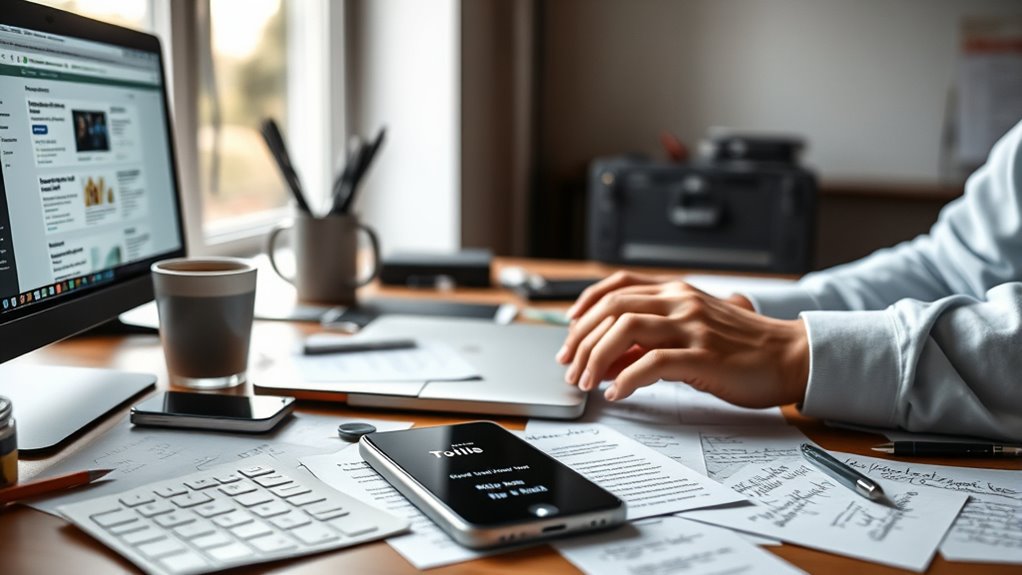Multitasking might seem like a way to boost productivity, but it actually drains your mental resources and increases mistakes. Your brain struggles to focus on multiple tasks, leading to divided attention, errors, and mental fatigue. Over time, this reduces overall effectiveness and can slow progress. Instead of doing everything at once, learning strategies to improve focus helps you work smarter. Keep exploring to discover how you can minimize the hidden costs of multitasking.
Key Takeaways
- Multitasking reduces cognitive focus, leading to more errors and superficial work rather than increased productivity.
- Task switching consumes mental energy, causing fatigue and diminishing overall efficiency over time.
- Hidden costs like mistakes, mental overload, and fatigue often outweigh perceived time savings.
- Deep, focused work yields higher accuracy and quality, whereas multitasking hampers performance and decision-making.
- Rethinking productivity metrics to include error rates and mental fatigue reveals multitasking’s true inefficiency.
The Psychology Behind Multitasking
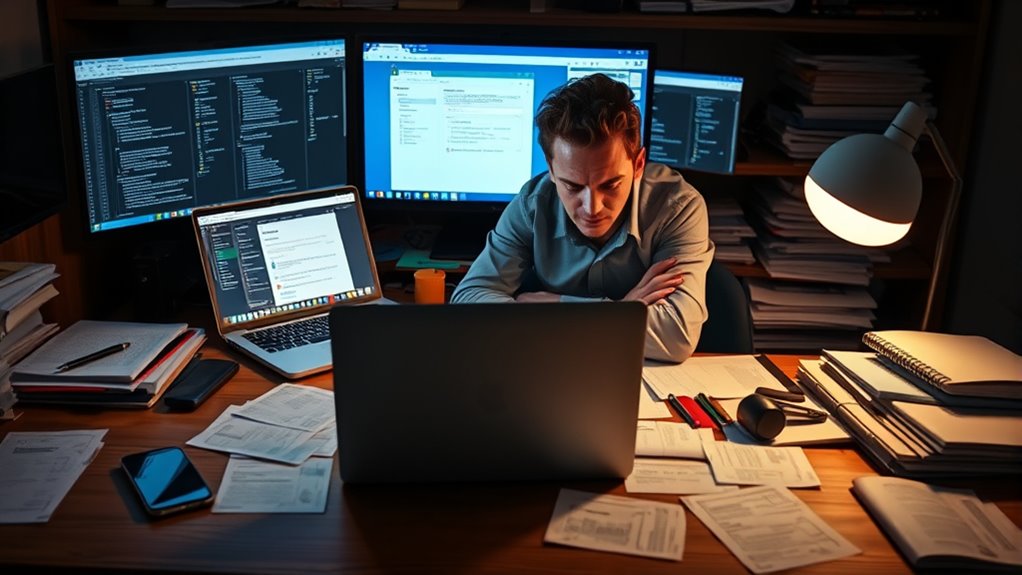
While many people believe they can handle multiple tasks simultaneously, your brain actually struggles to focus on more than one thing at a time. It’s not because you lack skill, but because your brain switches between tasks rather than processes them simultaneously. This switching, called task-set shifting, consumes mental energy and reduces efficiency. When you attempt to multitask, your prefrontal cortex—responsible for decision-making and focus—becomes overstressed. As a result, your attention divides, making it harder to process information thoroughly. The brain perceives switching as a form of effort, which can lead to increased stress and mental fatigue. Understanding this helps you realize that multitasking isn’t a sign of productivity, but rather a challenge your brain fights to overcome. Additionally, research shows that engaging in AI training jobs or other complex tasks can further tax your mental resources, making it even harder to switch focus effectively. Practicing mindfulness and stillness can help mitigate some of these effects by enhancing your mental clarity and emotional balance. Recognizing the importance of cognitive load management can also support better focus and overall mental well-being.
How Multitasking Affects Focus and Attention
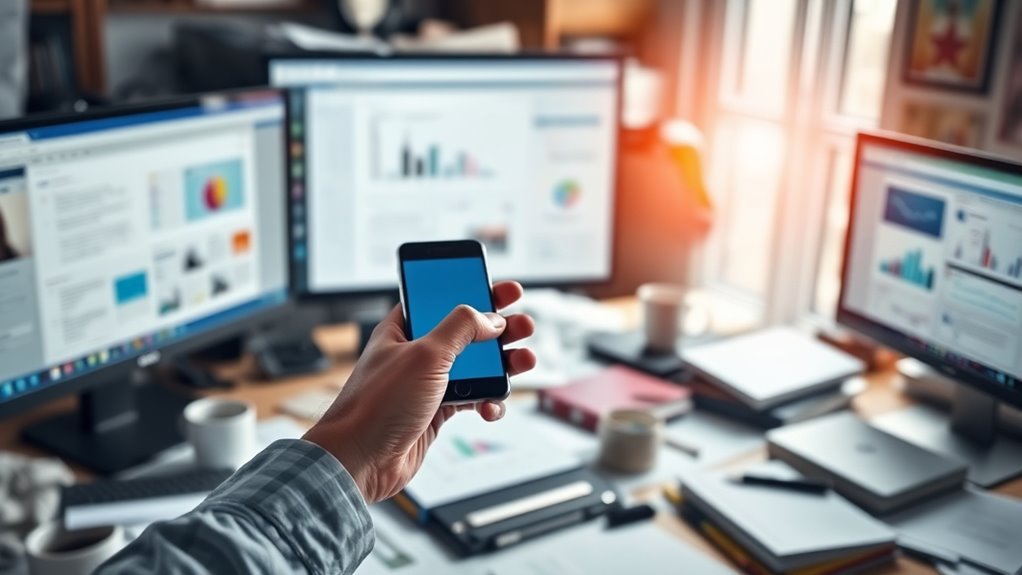
When you multitask, your attention gets split, making it harder to focus on any one thing. This divided attention often leads to more mistakes and less effective work. As a result, your ability to think clearly and stay attentive diminishes markedly. Additionally, engaging in multitasking with electric bikes or generators can compromise safety and performance. Using incompatible or poorly paired headphones with such devices may also cause audio issues or safety concerns due to distraction. Research indicates that somatic therapy techniques can help improve attention and emotional regulation, which may counteract some of the negative effects of multitasking. Furthermore, understanding the contrast ratio of your devices can enhance your visual focus during multitasking scenarios.
Divided Attention Decline
Multitasking divides your attention, making it harder to focus on any one task for long. When you switch between activities, your brain struggles to maintain the same level of concentration. Instead of fully engaging with one task, your attention becomes fragmented, reducing your overall efficiency. This divided focus hampers your ability to process information deeply, leading to superficial understanding. As a result, your concentration wanes faster, and you’re more prone to distraction. Over time, this constant shifting can diminish your capacity to sustain attention, making it difficult to complete complex or lengthy tasks. The decline in focused attention isn’t just temporary; it can have lasting effects on your ability to concentrate on important work or personal activities.
Increased Error Rates
Have you ever noticed how juggling multiple tasks often leads to more mistakes? When you try to split your attention, your focus becomes fragmented, making errors more likely. Multitasking overloads your brain’s ability to process information accurately, increasing the chances of overlooking details or misjudging situations. For example, switching between emails, reports, and conversations can cause you to miss important cues or make wrong assumptions. This diminished focus weakens your ability to catch mistakes before they happen, leading to costly errors. Additionally, digital literacy at home can help minimize distractions and improve focus by promoting healthier screen habits and digital responsibility. Proper attention management techniques can further aid in maintaining focus and reducing errors during multitasking. Recognizing the importance of brand reputation and product authenticity can also help prevent errors related to the use of ineffective or counterfeit products. Developing emotional awareness can assist in understanding when your stress levels are impacting your attention and decision-making.
Reduced Cognitive Clarity
As you divide your attention between multiple tasks, your ability to maintain clear and focused thinking diminishes. Multitasking overloads your brain, making it harder to process information deeply. This fragmentation hampers your capacity to prioritize, recall details, and make decisions efficiently. Additionally, decoding slang and informal language can further distract you, reducing your mental clarity. Instead of a steady stream of insights, your mind becomes scattered, leading to confusion and mental fatigue. AI-driven personalization can help tailor your workload to better match your cognitive capacity, reducing the need for constant multitasking. Additionally, incorporating structured routines can help streamline your mental resources and minimize unnecessary task-switching. Moreover, understanding the impact of automation in business can encourage the development of tools that support focused work and minimize distractions.
- Your thoughts jump from one topic to another, reducing comprehension.
- You struggle to filter out distractions, causing lapses in attention.
- Critical thinking and problem-solving become less effective as your focus wanes.
This reduced cognitive clarity leaves you feeling overwhelmed and less capable of performing tasks that require sustained mental effort. Ultimately, multitasking chips away at your mental sharpness, making it harder to stay on top of your work.
The Real Costs: Errors and Mistakes

Ever wonder how multitasking can quietly undermine your accuracy? When you juggle multiple tasks, your brain struggles to focus deeply on any one thing, increasing the chance of errors. These mistakes can range from simple typos to costly decision errors. The table below highlights common errors caused by multitasking:
| Error Type | Consequence |
|---|---|
| Data Entry Mistakes | Inaccurate reports, missed deadlines |
| Overlooking Details | Missed important info, overlooked emails |
| Calculation Errors | Flawed analyses, incorrect conclusions |
| Forgetting Tasks | Missed appointments, incomplete work |
| Communication Failures | Misunderstandings, lost opportunities |
These errors not only slow you down but also damage your credibility and confidence. Multitasking’s illusion of efficiency often hides the real cost: mistakes that require time and resources to fix. Additionally, research shows that multitasking hampers cognitive performance, making it harder to maintain accuracy over time. Engaging in single-task focus can significantly reduce these errors and improve overall productivity. Moreover, cultivating focused attention can help mitigate the adverse effects of multitasking on your work quality.
Multitasking and Productivity Metrics
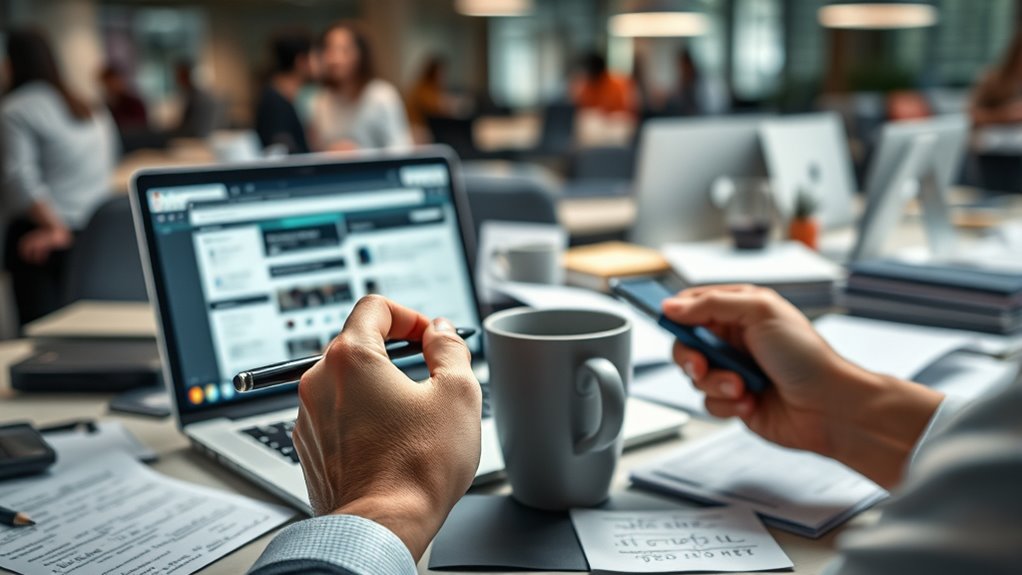
Multitasking often appears to boost productivity, but measuring its true impact reveals a different story. When you try to quantify multitasking’s effects, traditional metrics like task completion time or output volume can be misleading. These numbers might suggest efficiency, but they overlook the hidden costs, such as increased errors or mental fatigue. To truly understand multitasking’s impact, you need to look beyond surface-level data.
Here are some key points to contemplate:
- Task switching time: The seconds or minutes lost when shifting focus between tasks. Studies in home improvement highlight how vertical storage solutions and multi-functional furniture can reduce the need to reorganize frequently, illustrating the importance of efficient task management in physical spaces. Additionally, getting unstuck techniques can help minimize unnecessary task switching by providing clear pathways forward.
- Error rates: Increased mistakes that can negate perceived productivity gains. When multitasking, the cognitive load can overwhelm your mental capacity, leading to more errors and less effective decision-making. Additionally, passive voice detection tools can help identify and improve clarity by reducing passive constructions in your writing. Cultivating mindfulness can further help improve focus and reduce slips caused by divided attention.
Strategies to Improve Concentration
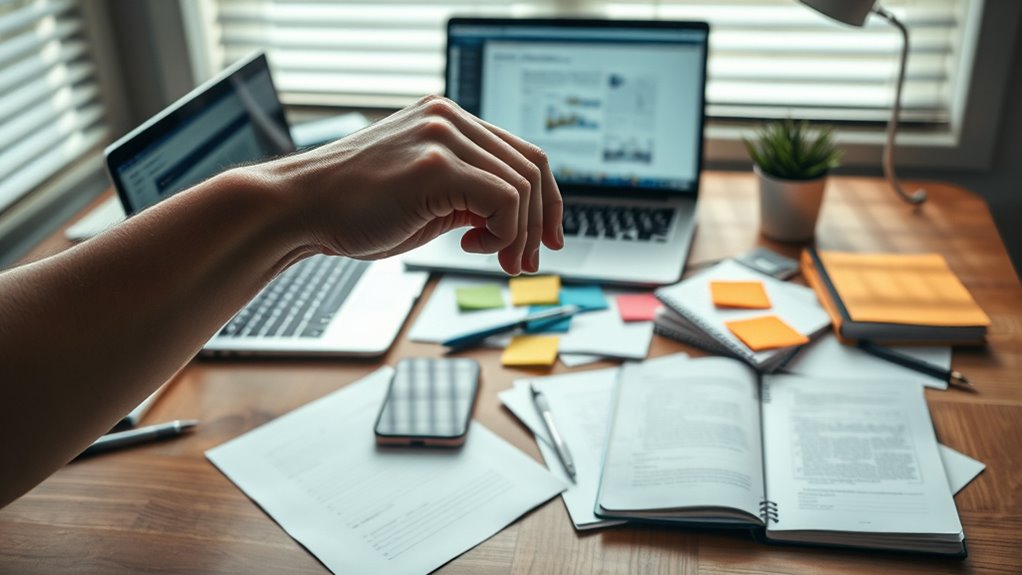
Improving concentration requires intentional strategies that minimize distractions and train your focus. First, create a dedicated workspace free from interruptions, like notifications or noise. Turn off alerts on your devices and set specific times to check emails or messages. Use the Pomodoro Technique—work intensely for 25 minutes, then take a 5-minute break—to build sustained attention. Prioritize tasks by listing them and tackling the most important ones when your energy peaks. Practice mindfulness or meditation regularly to strengthen your mental clarity. Avoid multitasking; focus on one task at a time to improve quality and efficiency. Additionally, using top mattress toppers can help improve sleep quality, which directly impacts your concentration. Ensuring adequate sleep is crucial because sleep quality significantly influences cognitive function and focus during the day. Incorporating techniques like exfoliation can also help refresh your mindset by promoting physical well-being, which is closely linked to mental performance. Finally, guarantee you get enough sleep, eat well, and stay hydrated, as physical well-being directly impacts your ability to concentrate.
Rethinking Our Approach to Work and Efficiency

Focusing solely on individual concentration isn’t enough in today’s fast-paced work environment. To truly boost productivity, you need a new approach that emphasizes systemic change. Start by creating dedicated work blocks free from interruptions, allowing deep focus. Incorporate regular breaks to recharge your mental energy. Also, prioritize tasks based on importance, avoiding unnecessary multitasking. Implementing flexible working hours can further enhance efficiency by accommodating individual productivity peaks. Consider these strategies:
Enhance productivity through systemic change: dedicated work blocks, strategic task prioritization, and minimizing distractions.
- Redesign workflows to minimize distractions
- Encourage team collaboration on focused projects
- Use technology to automate routine tasks
Frequently Asked Questions
Can Multitasking Ever Be Truly Effective in Any Context?
Multitasking can seem effective, but in reality, it often hampers your productivity. You might believe you’re getting more done, but your focus divides, leading to mistakes and slower progress. In some situations, like simple or routine tasks, multitasking might work briefly. However, for complex or demanding work, concentrating on one thing at a time yields better results, helping you work smarter, not harder.
How Does Multitasking Impact Long-Term Mental Health?
When you multitask, it might seem efficient, but over time, it can harm your mental health. Constant switching stresses your brain, leading to burnout, anxiety, and decreased focus. You may feel overwhelmed or frustrated, which affects your overall well-being. To protect your mental health, try to focus on one task at a time, give yourself breaks, and avoid the urge to multitask constantly.
Are There Specific Jobs or Tasks Where Multitasking Is Beneficial?
Imagine juggling glowing orbs effortlessly; in some jobs, multitasking feels just like that. You thrive when managing multiple projects, like in event planning or emergency medicine, where switching quickly keeps everything on track. These roles benefit from multitasking because they demand rapid adaptation and handling diverse tasks simultaneously. Yet, even then, staying focused on priorities remains vital to prevent chaos and maintain quality.
What Role Does Technology Play in Encouraging Multitasking?
Technology encourages multitasking by providing instant notifications, multiple apps, and easy access to information. You often find yourself switching between emails, social media, and work tasks, believing you’re being efficient. However, this constant switching can distract you and reduce focus. While technology makes multitasking easier, it also risks decreasing your overall productivity and quality of work. Being mindful of these influences helps you manage your attention better.
How Can Organizations Measure True Productivity Beyond Multitasking Metrics?
While multitasking might seem like a badge of efficiency, true productivity is often hidden beneath surface metrics. You can measure it by tracking meaningful outcomes, employee engagement, and quality of work, rather than just task completion. Regular check-ins and feedback foster growth and focus. Embracing deep work over constant switching helps reveal genuine progress, ensuring your organization values impactful results over superficial activity.
Conclusion
As you juggle tasks, remember that multitasking is like trying to catch butterflies—you might end up with none. Instead of spreading yourself thin, focus like a laser beam, illuminating one task at a time. By sharpening your attention, you turn chaos into clarity, transforming a cluttered mind into a peaceful lake. Embrace this shift, and watch your productivity bloom like a well-tended garden, blossoming with quality and purpose.

